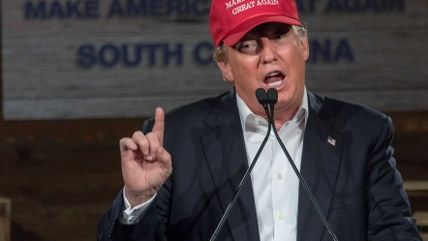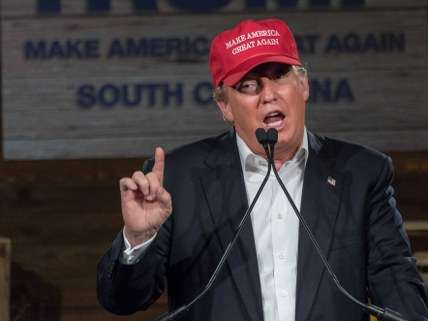What Trump's Win Means for Food and Agricultural Policy
Should we expect a scaling back of regulations or even repeals?


The looming presidency of Donald Trump has left many (perhaps most) Americans uncertain of what the future might hold. On my beat—food and agricultural law—that future is no clearer.
Eight years of food and agricultural policy under President Barack Obama was mostly chaff. First Lady Michelle Obama planted an organic garden on the White House grounds and sought to work with the food industry to reduce calories, reformulate foods, and promote exercise in an unsuccessful attempt to reduce obesity rates in this country. Obama's activist FDA banned trans fats, pushed for "added sugar" labeling on packaged foods, and adopted sweeping new food safety regulations under the Food Safety Modernization Act. The Affordable Care Act, Obama's signature legislation, contains requirements for nationwide calorie labeling on many restaurant menus.
Farm subsidies administered by the USDA ballooned to unprecedented levels during the Obama administration. The USDA co-published controversial new dietary guidelines. And the First Lady championed changes to the USDA National School Lunch Program that mandated the serving of more whole grains, fruits, and vegetables.
Save for the first lady's White House garden, I've been mostly critical of these actions.
Given Trump's putative status as the anti-Obama, how might a Trump administration differ from his predecessor when it comes to food and agricultural policy? We've gotten an early glimpse.
And so far, supporters of stricter regulations appear alarmed.
A set of Trump food and agriculture talking points obtained by Politico suggests "a shift back to conventional agriculture, to promises for the Trump White House to be an 'active participant' in writing the next Farm Bill, to fighting the so-called good food movement and undoing Obama-era agricultural and environmental policies."
As the Washington Examiner's Paul Bedard noted this week, a recent report by the American Action Forum suggests the Trump administration could cut a recent slew of regulations that would cost more than $40 billion under a law known as the Congressional Review Act. According to the AAF list, many recent food and agricultural rules—several billion dollars' worth—could be repealed as early as January.
The Trump administration also appears likely to roll back Michelle Obama's school lunch reforms. That sounds promising. But, as I detail in my book, Biting the Hands that Feed Us, any reversal of course that simply returns the failing program to the flailing program it was five or ten years ago is untenable.
Trump's stance on immigration—not just a human rights issue but also a key food and agricultural issue, as many of the people who grow, pick, cook, and buy our food are immigrants—is frighteningly bad. Ditto his position on (or, rather, against) free trade.
Outside of specific laws and regulations the administration might embrace, some other indicators have emerged recently. For example, Quartz reports the Trump transition team is being headed by a veteran food lobbyist. And while the lists of potential cabinet heads of the USDA and HHS (which houses the FDA) are still reasonably long, they're not terribly inspiring.
So food and agricultural policy will likely look very different under Trump than it's looked under Obama, who, in the words of one Associated Press writer this week, "made healthier, safer and better labeled food a priority[.]"
That characterization is, in my view, quite a reach.
The Obama administration made regulating food a priority. But many of its regulations don't appear to have made us healthier, or our food safer or better labeled.
Even Obama supporters found his administration's stance on food to be "more symbolic than substantive."
Maybe that's also what we should hope for under Trump. I'll stomach Trump's cruel symbolism on immigration and trade over any substantive action by him that reflects his views in these areas. And if the Trump administration reins in the FDA and slashes farm subsidies—neither a sure bet, but essential starting points—then he may not be as bad as I and millions of other people living in America fear.



Show Comments (146)